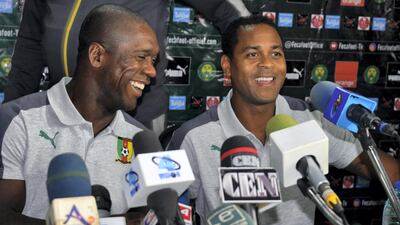Votes are still being counted following Sunday's presidential elections in Cameroon, where one opposition candidate has declared himself the victor already, but the incumbent, 85-year-old Paul Biya, is widely expected to emerge with his 36-year rule extended. Whoever is in the office, there is work to be done on the project designed to draw global attention to the country in less than nine months time.
Biya hosted a small delegation from Caf, the governing body of African football last week to reassure them that preparations for hosting the largest-ever Africa Cup of Nations finals in mid-2019 are on track. Caf’s preliminary scrutiny cast some doubts, Caf's president Ahmad Ahmad observing: “There is a lot still to do, and not much time left.”
He offered some encouragement. “Cameroon has overcome many obstacles already, and with all its great football history, would be the best host,” Ahmad said. Privately, soundings have been made to other countries, notably Morocco, about their readiness to host the tournament next June and July in case of a crisis.
A more urgent evaluation of Cameroon’s backlog in terms of infrastructural work, on hotels and stadiums, will be made next month by Caf, who know the next Nations Cup needs to be a successful showpiece. African football's reputation suffered a little at the World Cup in Russia, with none of the five competing teams going beyond the first group stage. And Caf have boldly expanded their biennial festival, the Nations Cup: There will be 24 countries competing next year, up from 16, which means a longer schedule. They have altered its place in the calendar, no longer a new year event taking place while major domestic leagues are going on, which means no more club-versus-country sagas over player availability. With a June there is also a larger potential broadcast audience to reach out to.
The increased number of finalists means that, going into this week's third and fourth matchdays of Afcon qualification, there is less jeopardy for the traditional heavyweights, although Nigeria, having lost to South Africa in a tricky group led by Libya, already have ground to make up. Pierre-Emerick Aubameyang’s Gabon are also stuck outside the qualifying positions in their Group C, behind Burundi, who have reinforced their forward line by committing the former England Under 21 striker, Saido Berahino to an senior international career with the country of his birth.
_______________
Read more:
Steve Luckings: Africa Cup of Nations offers Mohamed Salah chance to regain scoring touch
Former Real Madrid defender Michel Salgado joins Egypt coaching set-up
Bitter linguistic divide is pushing Cameroon over the edge
_______________
As for the designated hosts, the defending champions Cameroon, their preparations on the field have been as rocky as off it. The Belgian, Hugo Broos, who guided the so-called "Indomitable Lions" to success in the 2017 tournament, has left, the Cameroonian FA are operating under a Fifa-appointed "normalisation committee" following an administrative breakdown and the coaches given the task of shaping a side to make a nation proud next year are high-profile but short on experience.
Clarence Seedorf, the serial European Cup winner and former Netherlands international midfielder is manager, his assistant his Dutch former colleague, Patrick Kluivert. Seedorf, 42, has managed AC Milan, China’s Shenzhen and Spain’s Deportivo La Coruna but none of those for more than six months. He had never worked in Africa before.
He will take charge of his first home Cameroon match on Friday, in Yaounde against Malawi, determined his team should make a better impression than they did on the debut of Seedorf and Kluivert on the bench, when Cameroon had to come from behind to draw with the Comoros Islands. There have been shake-ups already, with former captain Benjamin Moukandjo, of Beijing Renhe, left out of his squad, Seedorf remarking that “good young players aren’t competitive if they play in the Chinese league".
Moukandjo, 29 and a star of the last Nations Cup, announced his international retirement as a result, although Seedorf has since suggested a climbdown might yet be negotiated. It could be demanded by the public if the matches - home this week, away next week - against Malawi disappoint. Victories in those may turn out to carry more than just a morale boost, too.
As hosts, Cameroon qualify by right for Afcon 2019; if they were to lose their host status, the group games they are participating in - with Malawi, Morocco and the Comoros with the third-place team given a tie-breaker chance to go the finals if Cameroon finish above them - may turn out to be crucial to any defence of their title.


